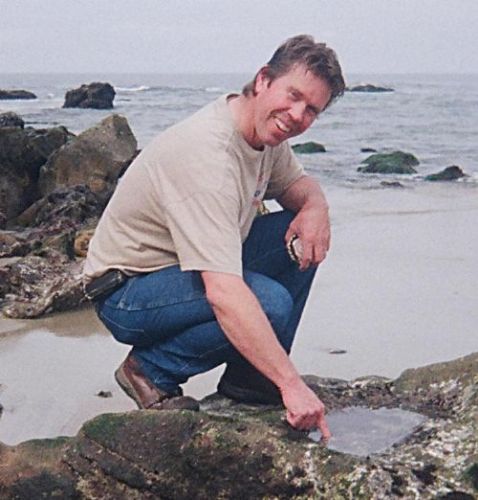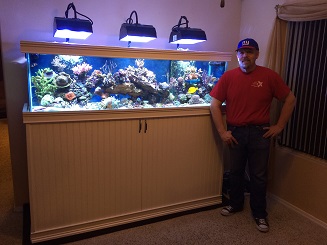| Author |
 Topic Search Topic Search  Topic Options Topic Options
|
richins1 
Guest


Joined: November 09 2007
Location: United States
Status: Offline
Points: 29
|
 Post Options Post Options
 Thanks(0) Thanks(0)
 Quote Quote  Reply Reply
 Topic: Substrate Depth? Topic: Substrate Depth?
Posted: November 24 2007 at 11:20pm |
I am a little bit confused on how much substrate to put into my tank. I have read that you don’t want much more than an inch because of the formation of anaerobic bacteria that in turn put off harmful things in that water. But when I see picture of peoples tanks they have about two or three inches?
|
 |
Adam Blundell 
Presidency


Joined: June 24 2002
Location: Davis County
Status: Offline
Points: 18526
|
 Post Options Post Options
 Thanks(0) Thanks(0)
 Quote Quote  Reply Reply
 Posted: November 24 2007 at 11:33pm Posted: November 24 2007 at 11:33pm |
I'd go four inches if it were me.
Adam
|
|
Come to a meeting, they’re fun!
|
 |
Mike Savage 
Guest


Joined: July 15 2005
Location: Murray
Status: Offline
Points: 19173
|
 Post Options Post Options
 Thanks(0) Thanks(0)
 Quote Quote  Reply Reply
 Posted: November 24 2007 at 11:52pm Posted: November 24 2007 at 11:52pm |
3" is minium for me even in my Red Sea Max.
Mike
|
|
|
 |
chk4tix 
Guest


Joined: April 06 2007
Location: Texas
Status: Offline
Points: 4320
|
 Post Options Post Options
 Thanks(0) Thanks(0)
 Quote Quote  Reply Reply
 Posted: November 25 2007 at 12:25am Posted: November 25 2007 at 12:25am |
|
I personally have 4, but I guess it's your tank and if you want 1" then go for it
|
|
Original Crappy Reef Club Member #2
|
 |
dkle 
Guest


Joined: February 15 2004
Location: Taylorsville
Status: Offline
Points: 1784
|
 Post Options Post Options
 Thanks(0) Thanks(0)
 Quote Quote  Reply Reply
 Posted: November 25 2007 at 1:45am Posted: November 25 2007 at 1:45am |
|
I don't really know how the numbers came about (never researched it far back enough; although I know I should have, LOL), but I read that a deep sandbed is 6+ inches. That's when the bottom layer becomes anaerobic. While it is true that a deep sandbed produces hydrogen sulfide that can wipe out a whole tank when leaked into water, the leakage doesn't occur unless you disturb the sandbed.
The shallow sandbeds that I've seen were usually around 3-4 inches; but there is no rule stated that it has to be 3-4 inches. A lot of it has to do with personal preferences.
|
|
If you can't bedazzle them with your brilliance, baffle them with your bs!
Dinhkim Le - Procrastinator extra-ordinare
|
 |
Mike Savage 
Guest


Joined: July 15 2005
Location: Murray
Status: Offline
Points: 19173
|
 Post Options Post Options
 Thanks(0) Thanks(0)
 Quote Quote  Reply Reply
 Posted: November 25 2007 at 9:09am Posted: November 25 2007 at 9:09am |
The needed depth for a DSB is dependent on the particle size that makes it up. You can use a shallower bed with substrate that packs tighter.
Mike
|
|
|
 |
Shane H 
Presidency


Joined: March 09 2003
Location: Brigham City
Status: Offline
Points: 7921
|
 Post Options Post Options
 Thanks(0) Thanks(0)
 Quote Quote  Reply Reply
 Posted: November 25 2007 at 10:00am Posted: November 25 2007 at 10:00am |
I prefer 4-5 inches.
I do however think that you will get an anaerobic zone in a 4 inch sandbed. Especially if you isolate it to keep out any animals that may disturb the bottom most layer.
|
 |
cl2ysta1 
Guest


Joined: October 02 2007
Location: Cedar City, UT
Status: Offline
Points: 4203
|
 Post Options Post Options
 Thanks(0) Thanks(0)
 Quote Quote  Reply Reply
 Posted: November 25 2007 at 12:01pm Posted: November 25 2007 at 12:01pm |
I only have about .5-1 inch in my main tank. This has been standard practice for us ever since we had a few ppl in our reef club lose whole tanks when stirring up sandbeds that were deep. You CAN do a deep sandbed but i'd suggest it in a refugium where you are not going to stir it up moving rocks and frags around. I would NEVER do a deep sand bed again in a tank after all of the bad luck we have had. but it is standard practice for a lot of reefers. There is quite a bit of information on the internet about this. I only have 1 inch in the display but when my refugium is going i will have a deeper sand bed in that. Many people even do bare bottom tanks. I only have the slight sand i do to give pods a place to grow and a place to shove frags.
what it all boils down to is personal preference
|
|
I <3 Boxers
Achilles tang lover
|
 |
Mark Peterson 
Paid Member


Joined: June 19 2002
Location: Murray
Status: Offline
Points: 21436
|
 Post Options Post Options
 Thanks(0) Thanks(0)
 Quote Quote  Reply Reply
 Posted: November 25 2007 at 2:27pm Posted: November 25 2007 at 2:27pm |
As I understand it, in the biological nature of our aquariums, as in the wild, there are many processes occuring simultaneously. Everyone has heard of the Nitrogen cycle, but few have heard of the Carbon cycle and even fewer have heard of the Sulfer cycle. These natural processes are what create a fully healthy biological system. The DSB allows these systems to grow to full maturity. But remember, as in nature, storms are a necessity to keeping everything doing well in the long term. See this thread for my comments about avoiding "old tank syndrome" http://www.utahreefs.com/forum/forum_posts.asp?TID=22048
Also read this thread for a load of useful information about setting up a good yet inexpensive reef aquarium:
Edited by Mark Peterson - November 25 2007 at 2:30pm
|
Reefkeeping Tips, & quick, easy setup tricks:www.utahreefs.com/forum/forum_posts.asp?TID=9244 Pay it forward - become a paid WMAS member 
|
 |
Dion Richins 
Presidency


Joined: April 03 2005
Location: Farmington
Status: Offline
Points: 11664
|
 Post Options Post Options
 Thanks(0) Thanks(0)
 Quote Quote  Reply Reply
 Posted: November 25 2007 at 5:17pm Posted: November 25 2007 at 5:17pm |
|
I run 3-5 in the display and sometimes even deeper in the refug. I just completely stirred up my 125 (after removing everything. And then drained the tank completely after getting all of the crap suspended into the water Colum) The tank has been up for 4 years and since I wanted to completely re-aquascape it. I figured it was time for a good cleaning. I did refer to those smarter than me that gave me suggestions that finally led to the final action. The tank has cycled a little (100g new water into a 180g system) but everything looks great.
|
|
|
 |
BobC63 
Admin Group


Joined: January 17 2007
Location: Lehi, UT
Status: Offline
Points: 8973
|
 Post Options Post Options
 Thanks(0) Thanks(0)
 Quote Quote  Reply Reply
 Posted: November 26 2007 at 5:52pm Posted: November 26 2007 at 5:52pm |
 richins1 wrote: richins1 wrote:
I am a little bit confused on how much substrate to put into my tank. I have read that you don’t want much more than an inch because of the formation of anaerobic bacteria that in turn put off harmful things in that water. But when I see picture of peoples tanks they have about two or three inches? |
1) Plenum the tank first  with eggcrate, pvc tubing, and window screen mesh
2) 3" of aragonite on top of that
3) a 2nd layer of window screen mesh to divide the 2 sandbed levels
4) 3" of finer grained sand to finish
5) No 'anaerobic' areas, no SO2 issues...
6) Oh - and no nitrates, either 
|
|
- My Current Tank: 65g Starfire (sitting empty for 2+ years) -
* Marine & Reef tanks since 1977 *
|
 |
Mark Peterson 
Paid Member


Joined: June 19 2002
Location: Murray
Status: Offline
Points: 21436
|
 Post Options Post Options
 Thanks(0) Thanks(0)
 Quote Quote  Reply Reply
 Posted: November 26 2007 at 7:24pm Posted: November 26 2007 at 7:24pm |
I believe that plenums also develop areas where the sulfer process does it's job. As I said, it's part of the natural process that allows our tanks to better simulate nature.
I believe the reason we heard so much about DSBs creating a sulfer zone is because of the sheer depth of those DSB's; 6+ inches. I don't think anyone ever recomended more than 6 inches, it just didn't make sense and it also takes up so much of the bottom of the tank...
|
Reefkeeping Tips, & quick, easy setup tricks:www.utahreefs.com/forum/forum_posts.asp?TID=9244 Pay it forward - become a paid WMAS member 
|
 |
BobC63 
Admin Group


Joined: January 17 2007
Location: Lehi, UT
Status: Offline
Points: 8973
|
 Post Options Post Options
 Thanks(0) Thanks(0)
 Quote Quote  Reply Reply
 Posted: November 26 2007 at 8:10pm Posted: November 26 2007 at 8:10pm |
Mark:
Agree with the second statement - but disagree with the first.
I have never come across a properly plenumed substrate that exhibits signs of SO2..
Also, there was an excellent article in the last edition of Marine & Reefkeeping (I think that's the mag title) re: plenums, where they examine some very large plenumed and non plenumed, DSB tanks at the Waikiki Aquarium; their research basically echoed my experience -
ALL of the non-plenumed displays had evidence of SO2 activity in certain areas of the sandbed;
NONE of the plenumed displays showed any SO2 presence at all.
|
|
- My Current Tank: 65g Starfire (sitting empty for 2+ years) -
* Marine & Reef tanks since 1977 *
|
 |
LordMaximo 
Guest


Joined: November 20 2007
Location: United States
Status: Offline
Points: 104
|
 Post Options Post Options
 Thanks(0) Thanks(0)
 Quote Quote  Reply Reply
 Posted: December 02 2007 at 2:04pm Posted: December 02 2007 at 2:04pm |
I have been using UG filter beds for years with a reverse flow feed to the UG filter bed. It helps keep any chance of posion gas build ups inthe tank.
I also have used 2 different types of substrate beds too. UG filter with crushed coral ~1" thick, divider as of a fine mash type, then the fine beach sand ~ 2" to 3" deep. The reverse flow does not cause any type of disruption in the fine sand......no build-ups or volcanic type burps in the sand either. I discovered this more then 25 years ago in Florida.
Plus I cleaned my tanks on a regular basis to help keep it looking good. The use of egg crate has gradually become more popular in the past few years as a wieght dispersment, and to keep burrowing critters from up setting rock formations.
As far as depths go...in reality, I have come across little valleys with more then 12" of sand and silt on the ocean floors. Corals everywhere and the place just streaming with activity. So in the open oceans and through out the southern islands of Florida, it actually was a great veriable of pools on shelves and in the Bahama's was a whole differnet world.
Deep pools at depths of 80ft with briliance of all sorts of life and fawna onthe assorted shelfs.
So, each to their own, it is up to your filtration setups and current flows in your individual tanks. Some fish require deep loose substrate to burrow and evolve as a more balanced living conditions, while others require more rock and vertical caves to be comfortable. Each fish is different with the surroundings they are introduced to in the final homes we choose to give them.
Good luck,
Maximo
|
|
Trigger Master
|
 |